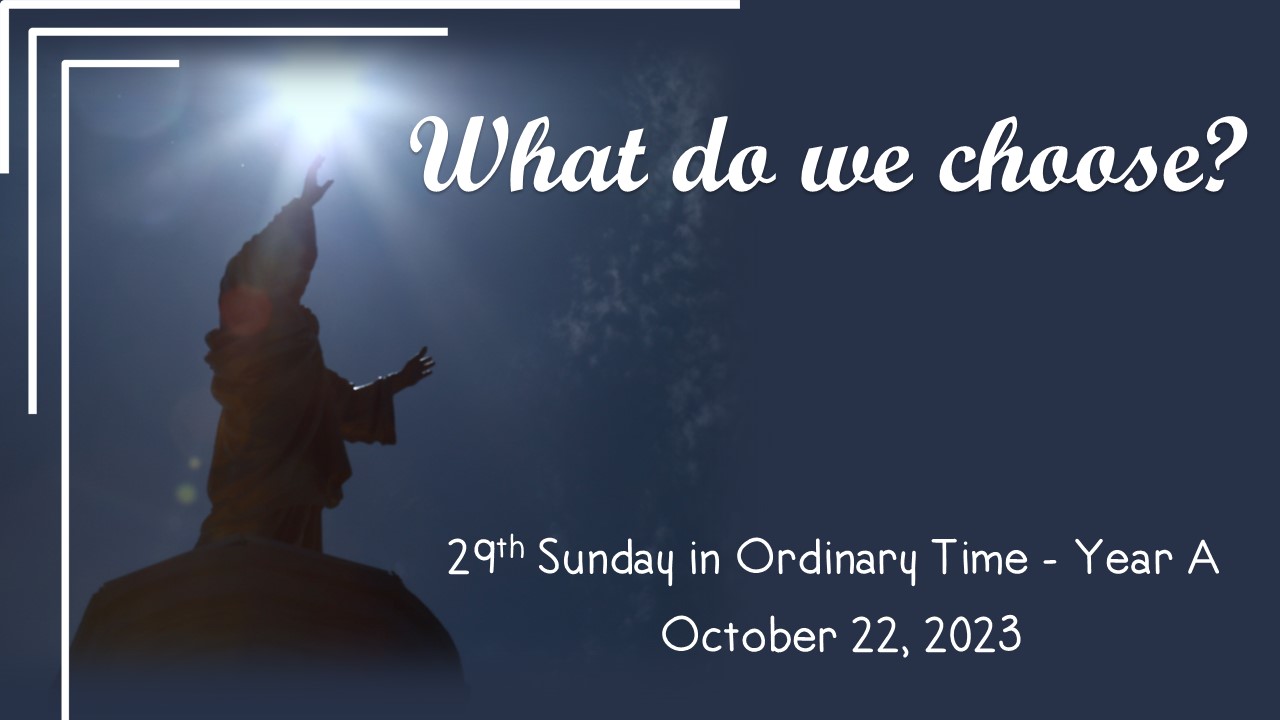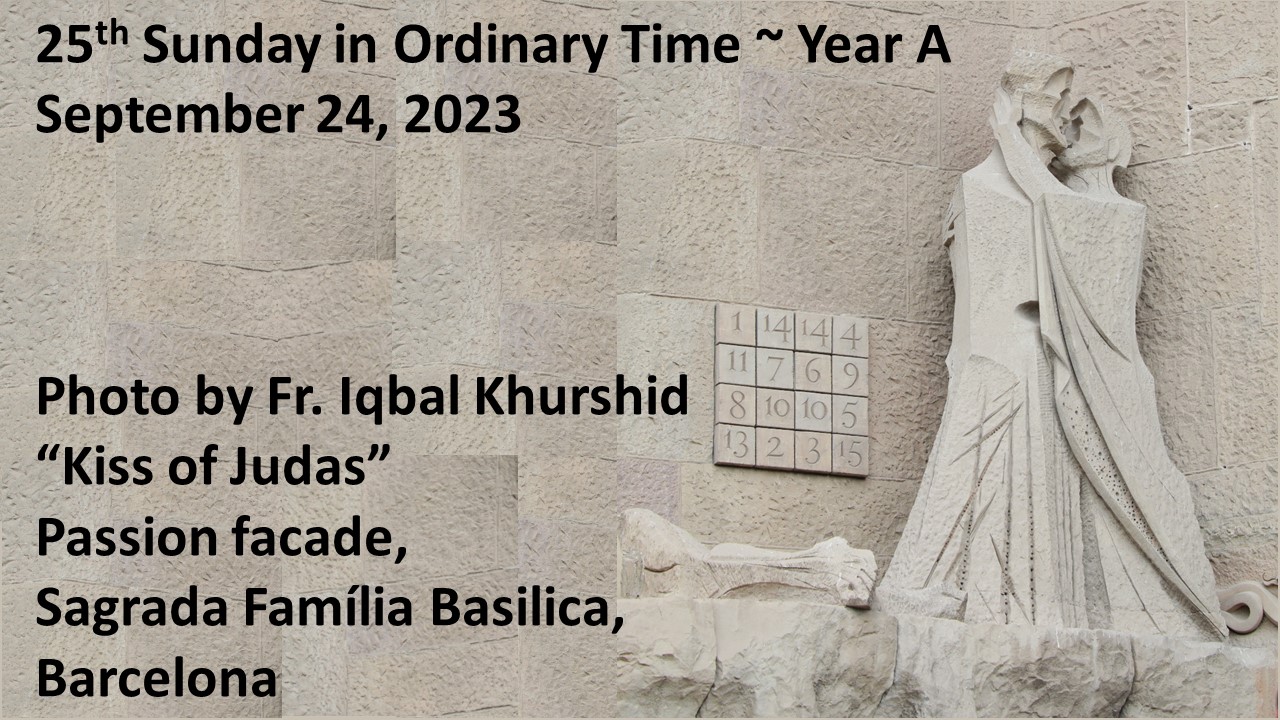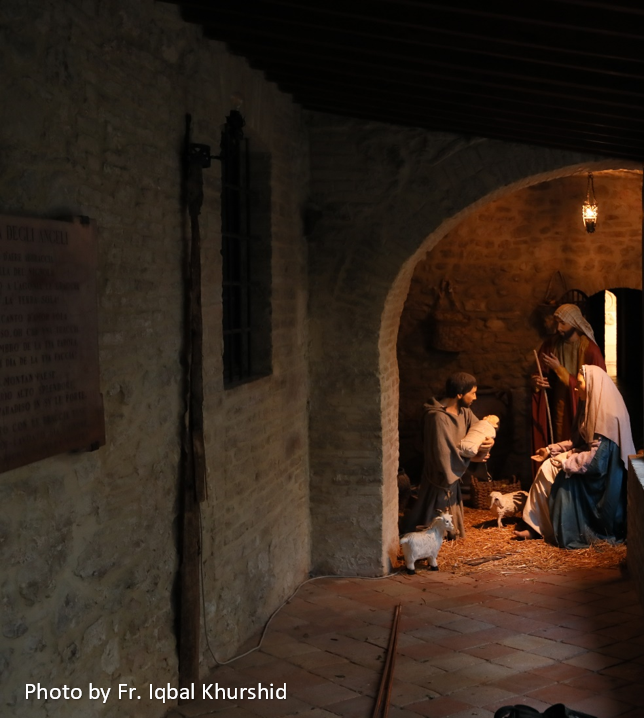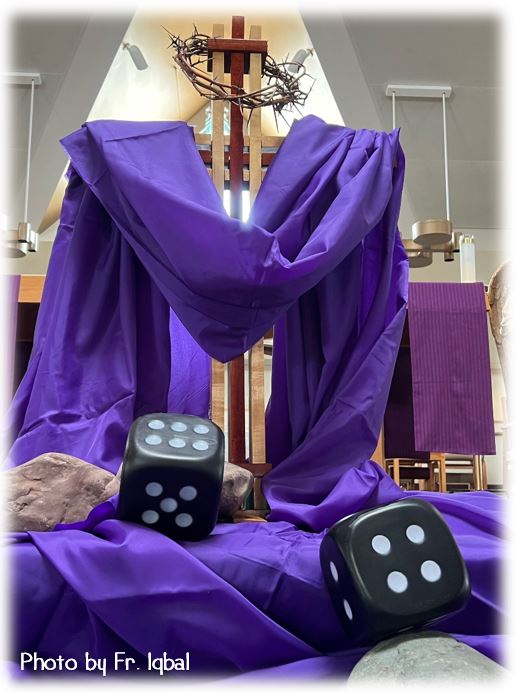
29th Sunday in Ordinary Time – Year A ~ October 22, 2023
WE ARE HIS BELOVED
An atheist professor of philosophy speaks to his class on the problem science has with God, The Almighty. He asks a believer… Prof: So you believe in God? Student: Absolutely, sir. Prof: Is God good? Student: Sure. Prof: Is God all-powerful? Student: Yes. Prof: My brother died of cancer even though he prayed to God to heal him. Most of us would attempt to help others who are ill, but God didn’t. How is this God good then? Hmm? (Student is silent.) Prof: You can’t answer, can you? Let’s start again, young fella. Is God good? Student: Yes. Prof: Is Satan good? Student: No. Prof: Where does Satan come from? Student: From…God… Prof: That’s right. Tell me son, is there evil in this world? Student: Yes. Prof: Evil is everywhere, isn’t it? And God did make everything, correct? Student: Yes. Prof: So, who created evil?
(Student does not answer.) Prof: Is there sickness? Immorality? Hatred? Ugliness? All these terrible things exist in the world, don’t they? Student: Yes, sir. Prof: So, who created them? (Student has no answer.) Prof: Science says you have 5 senses you use to identify and observe the world around you. Tell me, son, have you ever seen God? Student: No, sir. Prof: Tell us if you have ever heard your God? Student: No, sir. Prof: Have you ever felt your God, tasted your God, smelt your God? Have you ever had any sensory perception of God for that matter? Student: No, sir. I’m afraid I haven’t. Prof: Yet you still believe in Him? Student: Yes. Prof: According to empirical, testable, demonstrable protocol, science says your God doesn’t exist. What do you say to that, son? Student: Nothing. I have only my faith. Prof: Yes. Faith. That is the problem science has. Student: Professor, is there such a thing as heat? Prof: Yes. Student: And is there such a thing as cold? Prof: Yes. Student: No, sir. There isn’t. (The lecture theatre becomes very quiet with this turn of events.) Student: Sir, you can have lots of heat, even more heat, superheat, mega heat, white heat, a little heat or no heat, but we don’t have anything called cold. We can hit 458 degrees below zero which is no heat, but we can’t go any farther after that. There is no such thing as cold. Cold is only a word we use to describe the absence of heat. We cannot measure cold. Heat is energy. Cold is not the opposite of heat, sir, just the absence of it. (There is pin-drop silence in the lecture theatre.) Student: What about darkness, Professor? Is there such a thing as darkness? Prof: Yes. What is night if there isn’t darkness? Student: You’re wrong again, sir. Darkness is the absence of something. You can have low light, normal light, bright light, flashing light, but if you have no light constantly, you have nothing, and it’s called darkness, isn’t it? In reality, darkness isn’t. If it were, you would be able to make darkness darker, wouldn’t you? Prof: So, what is the point you are making, young man? Student: Sir, my point is your philosophical premise is flawed. Prof: Flawed? Can you explain how? Student: Sir, you are working on the premise of duality. You argue there is life, and then there is death, a good God and a bad God. You are viewing the concept of God as something finite, something we can measure. Sir, science can’t even explain a thought. It uses electricity and magnetism but has never seen, much less fully understood either one. To view death as the opposite of life is to be ignorant of the fact that death cannot exist as a substantive thing. Death is not the opposite of life: just the absence of it. Now tell me, Professor. Do you teach your students that they evolved from a monkey? Prof: If you are referring to the natural evolutionary process, yes, of course I do.
Student: Have you ever observed evolution with your own eyes, sir? (The Professor shakes his head with a smile, beginning to realize where the argument is going.)
Student: Since no one has ever observed the process of evolution at work and cannot even prove that this process is an ongoing endeavour, are you not teaching your opinion, sir? Are you not a scientist but a preacher? (The class is in uproar.) Student: Is there anyone in the class who has ever seen the Professor’s brain? (The class breaks out into laughter). Student: Is there anyone here who has ever heard the Professor’s brain, felt it, touched or smelt it? No one appears to have done so. So, according to the established rules of empirical, stable, demonstrable protocol, science says that you have no brain, sir. With all due respect, sir, how do we then trust your lectures?
(The room is silent. The professor stares at the student, his face unfathomable.) Prof: I guess you’ll have to take them on faith, son. Student: That is it, sir. The link between man and God is faith. That is all that keeps things moving and alive.
That’s exact the message we get from today’s Readings because we are chosen and beloved of God. All of you know that I love taking pictures because they mesmerize me with the texture, colors, and formation. Photography for me is not a hobby but source of prayer, meditation and reflection which brings my focus on the Image of God and reminds me that everything in the universe bears the image of God. We read in the Book of Genesis that God created Adam on his own image.
Through the Sacred Scripture Readings, God is showing us his love to us by calling us his chosen even we do not know him. In the Gospel Jesus is being tested by the Pharisees and the scribes regarding paying the tax to the state. However, Jesus takes opportunity to teach the unexpected lessons to those people through the image on the icon: “Give therefore to Caesar the things are Caesar’s, and to God the things that are God’s.” What does it mean to bear the image of God in our day-to-day life? Let me share the following story with you to understand that why Jesus wants us to give what belongs to God.
After a few of the usual Sunday evening hymns, the church’s pastor slowly stood up, walked over to the pulpit and, before he gave his sermon for the evening, briefly introduced a guest minister who was in the service that evening. In the introduction, the pastor told the congregation that the guest minister was one of his dearest childhood friends and that he wanted him to have a few moments to greet the church and share whatever he felt would be appropriate for the service.
With that, an elderly man stepped up to the pulpit and began to speak. “A father, his son, and a friend of his son were sailing off the Pacific Coast,” he began, “when a fast-approaching storm blocked any attempt to get back to shore. The waves were so high that, even though the father was an experienced sailor, he could not keep the boat upright, and the three were swept into the ocean as the boat capsized.”
The old man hesitated for a moment, making eye contact with two teenagers who were, for the first time since the service began, looking somewhat interested in the story. The aged minister continued with his story. “Grabbing a rescue line, the father had to make the most excruciating decision of his life: to which boy he would throw the other end of the lifeline. He only had seconds to make the decision. The father knew that his son was a Christian, and he also knew that his son’s friend was not. The agony of his decision could not be matched by the torrent of the waves. As the father yelled out, ‘I love you, son!’, he threw out the lifeline to the son’s friend. By the time the father had pulled the friend back to the capsized boat, his son had disappeared beneath the raging swells into the black of night. His body was never recovered.”
By this time, the two teenagers were sitting up straight in the pew, anxiously waiting for the next words to come out of the old minister’s mouth. “The father,” he continued, “knew his son would step into eternity with Jesus, and he could not bear the thought of his son’s friend stepping into an eternity without Jesus. Therefore, he sacrificed his son to save the son’s friend. How great is the love of God that He could do the same for us. Our heavenly Father sacrificed His only begotten Son that we could be saved. I urge you to accept His offer to rescue you and take hold of the lifeline.”
With that, the old man turned and sat back down in his chair as silence filled the room. The pastor again walked slowly to the pulpit and delivered a brief sermon with an invitation at the end. However, no one responded to the appeal. Within minutes after the service, the two teenagers were at the old man’s side. “That was a nice story,” politely said one of the boys, “but I don’t think it was very realistic for a father to give up his only son’s life in hopes that the other boy would become a Christian.”
“Well, you’ve got a point there,” the old man replied, glancing down at his worn Bible. Sorrow began to overtake the old man’s smiling face as he once again looked up at the boys and said, “It sure isn’t very realistic, is it? But I’m here today to tell you that I understand more than most the pain God must have felt to give up His only Son. For you see, I’m the man who lost his son to the ocean that day, and my son’s friend that I chose to save is your pastor.”
In five weeks, time, Mother Church will celebrate the universal Kingship of Jesus Christ popularly called the Feast of Christ the King. This feast ends the Church’s Liturgical Year. The Readings of the last three Sundays reminded us of the second coming of Christ. It urged us to respond to God’s invitation to the heavenly banquet, a rejection of which is a total rejection of God and the beatific vision.
In the First Reading, God proves Himself faithful to the house of Israel to the extent that even when he did not find a worthy leader among His chosen people to rescue them from their enemies, He finds a pagan King, Cyrus to bring them out of Babylonian exile. The Prophet says, “For the sake of my servant Jacob, and Israel my chosen, I call you by your name, I surname you, though you do not know me…” In the Chapter 49 we read “But Zion said, ‘The Lord has forsaken me, my Lord has forgotten me. Can a woman forget her nursing child, or show no compassion for the child of her womb? Even these may forget. Et I will not forget you. See, I have inscribed you on the palms of my hands; your walls are continually before me.” In Psalm 139 we read that God has created us wonderfully in our mother’s womb. King Solomon acknowledges the power of God “Even I don’t know how the Spirit of God entered into my mother’s womb and became living being”.
In today’s Gospel the Pharisees try once again to entrap Jesus in His speech. They realize that they are being portrayed by Jesus as having refused an invitation to conversion of heart (please read last Sunday’s banquet story Matthew 22:1-14). Therefore, they begin to plot against Jesus by launching an attack. They begin their questioning by flattering Jesus, attempting to take Him off guard. A Pharisee compliments Jesus for being honest, teaching the way of God authentically, and taking no account of any person’s status or opinion.
Indeed, Jesus’ authority was a servant authority or leadership. Thus, as we anticipate the Feast of Christ the King, Mother Church presents to us the servant Kingship of Jesus as a model for all authority figures.
Two images are before us: that of Caesar and that of God. To the first image, Jesus asks a simple question: “Whose picture is on the coin?” And the answer is simple, “Caesar.” Therefore, give to Caesar what belongs to him, that is the part of your possession that belongs to him. But Jesus also has a second, penetrating question: Whose image and blessing is on every human being? And the answer is simple, “God’s.” Therefore, give to God what belongs to him, that is your entire being, whole and undivided.
From whom do we receive the blessings of life and to whom do we owe thanksgiving and allegiance? Is it God? Is service to God and to Caesar compatible? Or are they competing loyalties that carry with them divergent senses of blessing? The Lord commands not only to give to God what is God’s (that is, everything), but also to give to Caesar what is Caesar’s, that is to say, to live completely the requirements of justice and peace in social relationships, and to work for the common good.
Indeed, at the time that this incident took place, the Jews were under Roman rule, and they might have been having problem paying taxes to Caesar. They were, therefore, pre-occupied with overthrowing the Roman regime. Thus, they were anticipating a Messiah who will come and topple the Roman authority. But they found the opposite. They were so pre-occupied with toppling the Roman regime that they were ready to kill even when their weaknesses were laid bare to them by Jesus.
Today, like the Jewish authorities, we have rejected God’s offer of salvation which He has accomplished in Jesus Christ. We will not plot to kill Jesus, but we have rejected God because of our apathy to the things of God. During this pandemic, how many of us have really experienced God’s presence in our midst? We are living in a world which is too secular and encourages everyone not to believe in the existence of God.
On USA dollar “In God we trust” reminds us that wealth is to live better worldly life but not to forget him whose image of we bear. If the image of Caesar was stamped on Roman coins that were to be rendered to him, the human heart bears the imprint of the Creator, the one Lord of our life. He has marked us for his own and sent us on mission to the world. Do our human projects make us better prophets, servants, and agents of the Kingdom of Jesus?
Let us never be ashamed of working publicly for Jesus’ kingdom and telling people about Him. He alone guarantees us authentic joy and deep hope, for all the people in our time.” His kingdom will have no end. It is only those who bear the imprint of God who will be rewarded with salvation. Paul, in the Second Reading, used this image to warn believers not to be caught napping. Since we do not know when the Lord will return for His people, we must live in constant attitude of watching and waiting, while we are busy working and witnessing.
We should note that Jesus invites the people to make their own judgment of conscience; he does not make it for them. We would misunderstand the reply of Jesus if we thought it was meant to instruct us about the relationship that should exist between Church and State. His reply concerns, not the order of politics, but the order of moral responsibility – the individual’s duty to participate in the life of the nation in a way that best promotes the common good of justice and peace.
We are marked and blessed with God’s image. Let us never forget to whom we really belong, and why we really do the things we do. We are not called for ourselves, but we are summoned by the Lord and sent to the world, to proclaim His name and His saving works. We keep that image lit because we God has called us to be the light of the world. In Jesus we trust when we see his image of Sacred Heart because God has given us a perfect image of his love.
A wealthy man and his son loved to collect rare works of art. They had everything in their collection, from Picasso to Raphael. They would often sit together and admire the great works of art. When the Vietnam conflict broke out, the son went to war. He was very courageous and died in battle while rescuing another soldier. The father was notified and grieved deeply for his only son. About a month later, just before Christmas, there was a knock at the door. A young man stood at the door with a large package in his hands. He said, “Sir, you don’t know me, but I am the soldier for whom your son gave his life. He saved many lives that day, and he was carrying me to safety when a bullet struck him in the heart, and he died instantly. He often talked about you and your love for art.” The young man held out the package. “I know this isn’t much. I’m not a great artist, but I think your son would have wanted you to have this.”
The father opened the package. It was a portrait of his son, painted by the young man. He stared in awe at the way the soldier had captured the personality of his son in the painting. The father was so drawn to the eyes that his own eyes welled up with tears. He thanked the young man and offered to pay him for the picture. “Oh, no sir, I could never repay what your son did for me. It’s a gift.” The father hung the portrait over his mantle. Every time visitors came to his home; he took them to see the portrait of his son before he showed them any of the other great works he had collected. The man died a few months later. There was to be a great auction of his paintings. Many influential people gathered, excited over seeing the great paintings and having an opportunity to purchase one for their collection. On the platform sat the painting of the son. The auctioneer pounded his gavel. “We will start the bidding with this picture of the son. Who will bid for this picture?” There was silence. Then, a voice in the back of the room shouted, “We want to see the famous paintings. Skip this one.” But the auctioneer persisted. “Will somebody bid for this painting. Who will start the bidding? $100, $200?” Another voice said angrily, “We didn’t come to see this painting. We came to see the Van Goghs, the Rembrandts. Get on with the real art!” But still the auctioneer continued. “The son! The son! Who’ll take the son?”
Finally, a voice came from the very back of the room. It was the longtime gardener of the man and his son. “I’ll give $10 for the painting.” Being a poor man, it was all he could afford. “We have $10. Who will bid $20?” “Give it to him for $10. Let’s see the masters.” “$10 is the bid. Won’t someone bid $20?” The crowd was becoming angry. They didn’t want the picture of the son. They wanted the more worthy investments for their collections. The auctioneer pounded the gavel. “Going once, twice, SOLD for $10!” A man sitting on the second row shouted, “Now let’s get on with the collection!” The auctioneer laid down his gavel. “I’m sorry; the auction is over.” “What about the paintings?” “I am sorry. When I was called to conduct this auction, I was told of a secret stipulation in the will. I was not allowed to reveal that stipulation until this time. Only the painting of the son would be auctioned. Whoever bought that painting would inherit the entire estate, including the paintings. The man who took the son gets everything!” God gave His son 2,000 years ago to die on the cross. Much like the auctioneer, His message today is: “The son, the son, who’ll take the son?” Because, you see, whoever takes the Son gets everything. For God so loved the world that he gave his one and only Son, that whoever believes in him shall not perish but have eternal life. (John 3:16).
Jesus says “you can not serve two masters’ either you love and hate the other one. You can not serve both God and wealth”. What do we choose? Whose image do we bear in our lives?
Other Sermons In This Series

25th Sunday in Ordinary Time – Year A ~ September 24, 2023
September 22, 2023

REJOICING IN THE LORD – Sunday, December 12, 2021 – 3rd Sunday of Advent
December 10, 2021

1st Sunday of Lent – Year C – March 6, 2022
March 04, 2022

